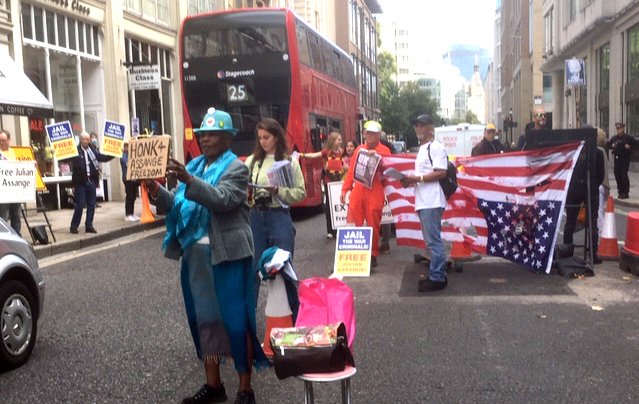
ON DAY four yesterday of the Old Bailey hearing deciding the fate of WikiLeaks founder Julian Assange the proceedings were adjourned until Monday while a lawyer is tested for Covid-19.
Assange was taken back to Belmarsh High Security Prison after Thursday’s session was adjourned.
Outside the court Assange’s supporters blockaded the street demanding that he is immediately freed.
Eighteen new charges were put on Julian Assange just before the hearing began on Monday, with the journalist and publisher facing extradition to the United States where he could receive a sentence of 175 years in jail … all for exposing the ‘war crimes’ of imperialism.
Judge Vanessa Baraitser adjourned the hearing at 10am after Edward Fitzgerald, a lawyer for the defence (Julian Assange), told the court: ‘We shouldn’t be here. Covid could be here in this courtroom. The staff and you yourself (addressing Baraitser) may be at risk, and finally our client whose vulnerabilities you are aware of, would be at risk.
‘Until we have a result we could make this remote, but you are aware of the technical difficulties and you have said the hearing should be held in court,’ Fitzgerald said. ‘It would not be fair if our client is not present.’
Some supporters of his campaign had queued yesterday since 5am to secure a place.
Only two people are allowed and can only watch on a screen in an adjacent court. Then at 10am everyone flooded out of the court after the adjournment.
News Line spoke to supporters who had travelled from Dublin and Germany to join the protest.
Tony Nolan said: ‘I have followed WikiLeaks all along and have been disgusted by the crimes of the US and UK. Julian is a victim of psychological torture as defined by the UN.
‘The problem with the mainstream media is that nobody is standing up for Julian but at the end of the day he is a journalist and all journalists should take warning from this.’
Reiner Jochhain said: ‘I have been campaigning for two years.
‘It’s because of him I became interested in politics. I got information through the involvement of WikiLeaks. It opened my eyes and the more I know what is going on in society I worry about the future for my children. If I see the injustice that happens to Julian the future will be horrible.
‘I suggest you look up Julian Assange on YouTube and you will have no choice but to get involved. We are not alone. More and more people are waking up.’
Before the adjournment the defence had called witness Professor Paul Rogers, Emeritus Professor of Peace Studies at the University of Bradford.
He has written nine books on the War on Terror, and has been for 15 years responsible for Ministry of Defence contracts on training of armed forces in law and ethics of conflict. Rogers appeared by videolink from Bradford.
Edward Fitzgerald QC asked Prof Rogers whether Julian Assange’s views are political. Prof Rogers replied that ‘Assange is very clearly a person of strong political opinions’.
Fitzgerald then asked Prof Rogers to expound on the significance of the revelations from Chelsea Manning on Afghanistan – Chelsea Manning leaked the documents from the US Army to WikiLeaks.
Prof Rogers responded that in 2001 there had been a very strong commitment in the United States to going to war in Afghanistan and Iraq.
Easy initial military victories led to a feeling the nation had ‘got back on track’, he said.
US President at the time – George W Bush’s first state of the union address had the ‘atmosphere of a victory rally’, he said.
But WikiLeaks’ revelations in the leaked war logs reinforced the view of some analysts that this was not a true picture, and that the war in Afghanistan had gone wrong from the start. It contradicted the government line that Afghanistan was a success. Similarly the WikiLeaks evidence published in 2011 had confirmed very strongly that the Iraq War had gone badly wrong, when the US official narrative had been one of success, Prof Rogers told the court.